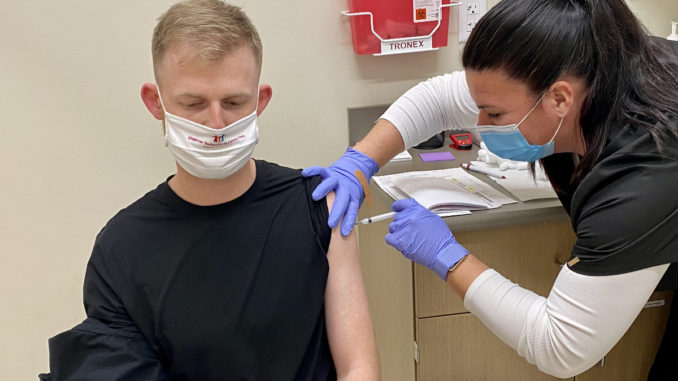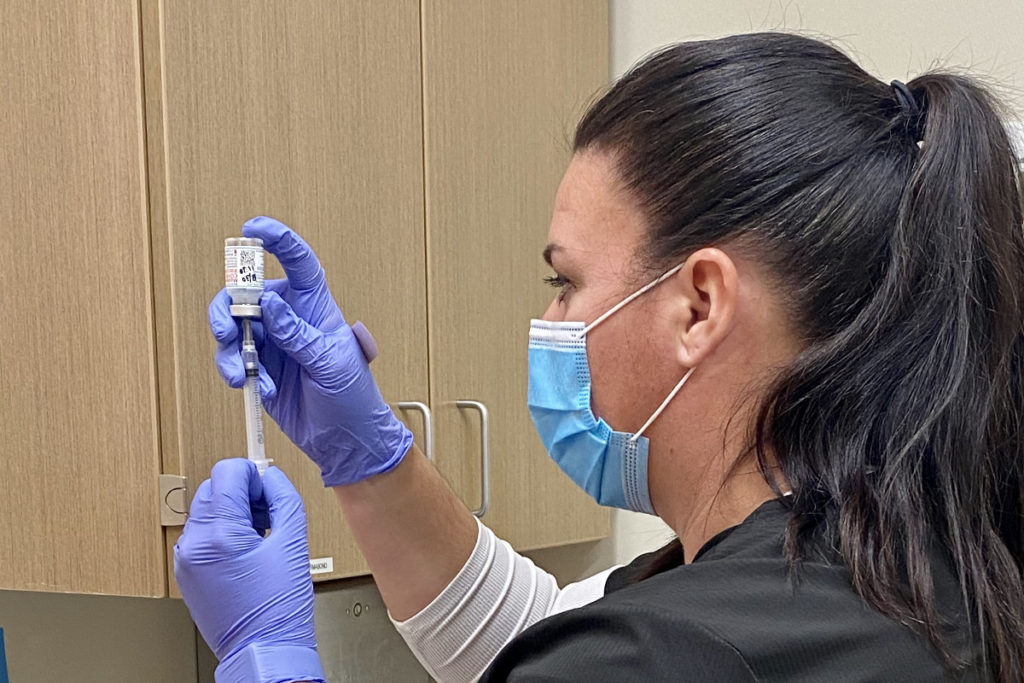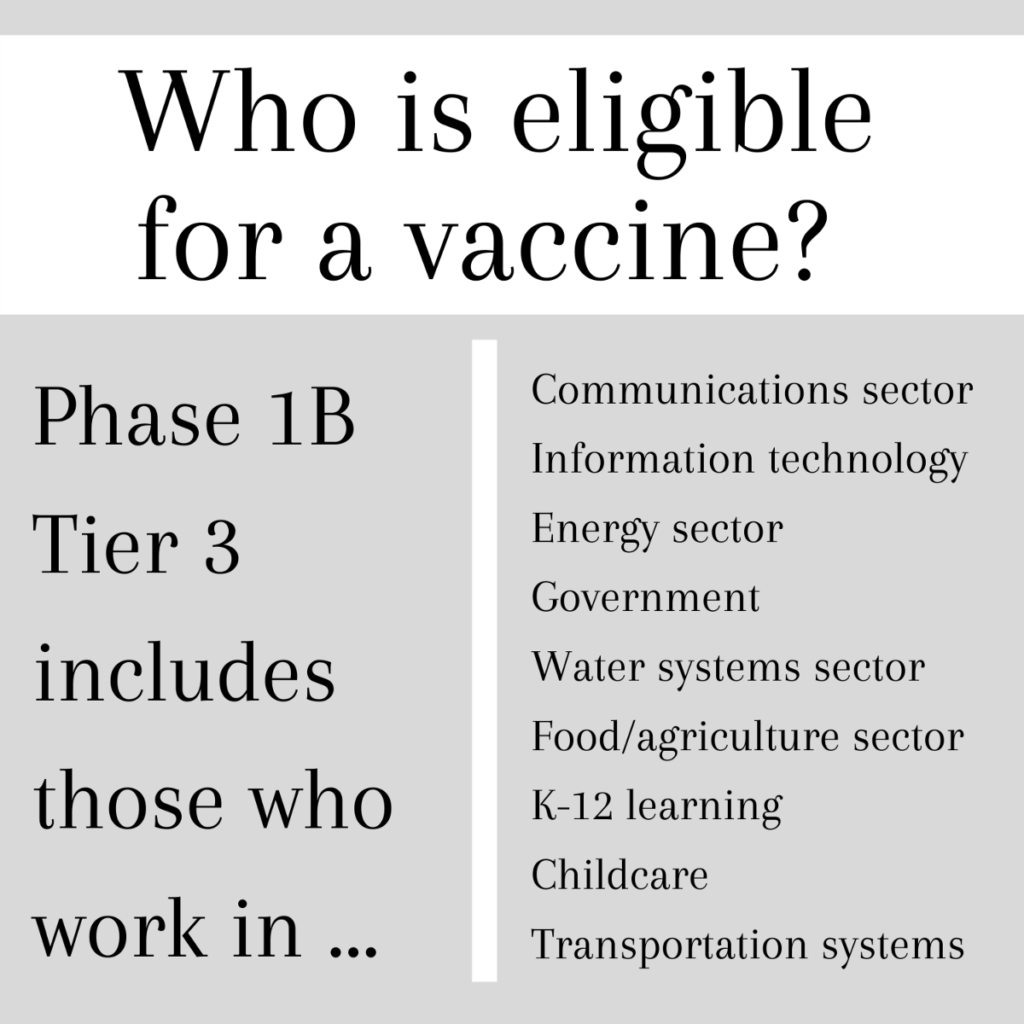
Missouri is now on Phase 1B – Tier 3 of its COVID-19 vaccination plan. Those who are now eligible for a vaccine include K-12 teachers, childcare providers, communications sector employees, information technology workers, food production workers and government officials.
This phase does not include higher education faculty, staff or students. Phase two is scheduled to go into effect Monday, March 29, and Phase 3 on Friday, April 9.
In a press release sent out March 18, Gov. Mike Parson said when all phases of Missouri’s vaccination plan are activated, approximately 4.5 million Missourians will be eligible. The state estimates that approximately 60% of Missouri citizens are interested in getting a vaccine.
“With the progress we are currently seeing and vaccine supply expected to increase significantly in the coming weeks, we are well ahead of schedule with our vaccine plan,” Parson said in a press release. “Supply projections are subject to change, but it is critical that we start preparing for this potential influx and ensure there is a consistent number of people who are eligible and interested in receiving a vaccine.”
The federal government told Missouri that COVID-19 vaccine allotments to the state are projected to significantly increase by the first week of April. Parson said the timeline for phases two and three ensures that there is a consistent number of people who are eligible and interested in receiving a vaccine.
Parson said phase two is estimated to extend vaccine eligibility to approximately 880,000 Missouri citizens. Phase two opens up the vaccine to those employed in construction, critical manufacturing, higher education, and remaining food and agriculture sectors. This phase also includes homeless and disproportionately affected populations.
Phase three of the vaccination plan will open vaccination to all Missouri adults, extending vaccine eligibility to an estimated 1.1 million Missourians who were not activated under any other tier or phase. More information on the specific qualification of these phases and tiers can be found on MOStopsCOVID.com/priority.
As of now, one in four people in Missouri have their first vaccination, according to a press release from the governor’s office. The state also estimates that 50% of Missouri’s 65 and older population have been vaccinated.
“Missouri’s position is continuously improving on the COVID-19 front,” Parson said. “With over 1.2 million Missourians having initiated vaccination, large increases in vaccine supply and the activation of Phases 2 and 3, we are confident that we are winning the battle against COVID-19.”
Jim LeBaron, administrator for the Adair County Health Department, said the vaccination rollout in Adair County has been really important for the community.
“The main thing is that we get our vaccine into the arms of people that want it as soon as possible,” LeBaron said. “I’m glad that the governor is opening this up on April 9. My conversations with the state is that I was asking that it be available to everyone sooner than this, but at least we got April 9 and that’s a good thing. It’s a good thing for Adair County.”
LeBaron said he hopes more of the vaccine is available to the county.
He said President Joe Biden’s administration has promised more vaccines in the coming months and he said the county is waiting like everyone else to see exactly what that rollout will look like.
“We are being told there’s plenty of vaccine for everybody that wants it,” LeBaron said.
The Health Department and community vaccinators have given over 10,000 doses of the COVID-19 vaccine, LeBaron said.
Including higher education students, LeBaron said he estimates close to one-third of the Adair County population has been vaccinated so far.

Brenda Higgins, associate vice president for student health and wellness, said places like Hy-Vee and Walgreens are offering to vaccinate anyone with their leftover shots. While the majority of students are not able to get vaccinated until phase three, she still recommends people call vaccination sites to see if they have any extra appointments available to use spare vaccinations.
“If they have extra doses that have to be used because they can only be thawed out for a certain amount of time … you can get on wait lists,” Higgins said, “At that point, they’ve already vaccinated those who are signed up. And these are doses that are going to have to be destroyed. And so they would rather put it in anyone’s arm than to put it in the trash can.”
Students will most likely not be required to get a vaccination before the fall semester, as long as the vaccines all fall under the emergency use protocol, Higgins said.
Higgins said the University can require vaccines like the MMR or meningitis vaccine because they are both Food and Drug Administration approved. However, the COVID-19 vaccine is only authorized for emergency use so the University cannot ask if students, faculty or staff have been vaccinated nor can they require the vaccine.
“Now, with that said, I absolutely believe it’s safe,” Higgins said. “I think it has been studied very thoroughly and over a long period of time, just not for COVID, for other SARS viruses and I’m very comfortable with it. But as far as a legal matter, until it’s an FDA approved vaccine, it probably won’t be required.”
Higgins said she is concerned about the part of the population who is vaccine hesitant or vaccine resistant.
Higgins said people are hesitant about the vaccines for a number of different reasons, whether they just don’t believe in vaccines, they don’t believe they’re safe, they thought the approval process was rushed or they are abstaining for political reasons.
“A big concern of mine is just that even once vaccines are available, that we may still have a lot of people who are hesitant or refuse to get the vaccine,” Higgins said. “I think that could impact where we are in the fall. So that’s one of my biggest concerns.”
Labaron said Adair County is very split in its opinion of the vaccine, similar to the county’s opinion about masking.
LeBaron said the Adair County Health Department Board of Trustees met on Monday and unanimously voted to keep the mask mandate in place until at least April 12, when they will revisit current data and discuss options.
At the meeting there were people there both for and against the mandate, LeBaron said. He also urges people to vote in the upcoming April 6 election, where members of the Adair County Health Department Board of Trustees will be elected.
LeBaron said this might be the most important election for the Health Department in its history. He urged citizens to take a look at the candidates and make an informed vote.
LeBaron said while the county might have different views on masks and getting a vaccine, the response from some citizens to the vaccine has been emotional.
“I’ve really been moved by the tears,” LeBaron said. “It really, it just breaks your heart when people are crying when they get their vaccine. Cause they’re so relieved, you know, and so thankful to get the vaccine.”
LeBaron said he has had both doses of the vaccine and had little to no side effects, he said the vaccines are backed by science and are effective.
He said any chance to increase COVID-19 vaccine shots in the community is good and urges people to get a vaccine where they can.

